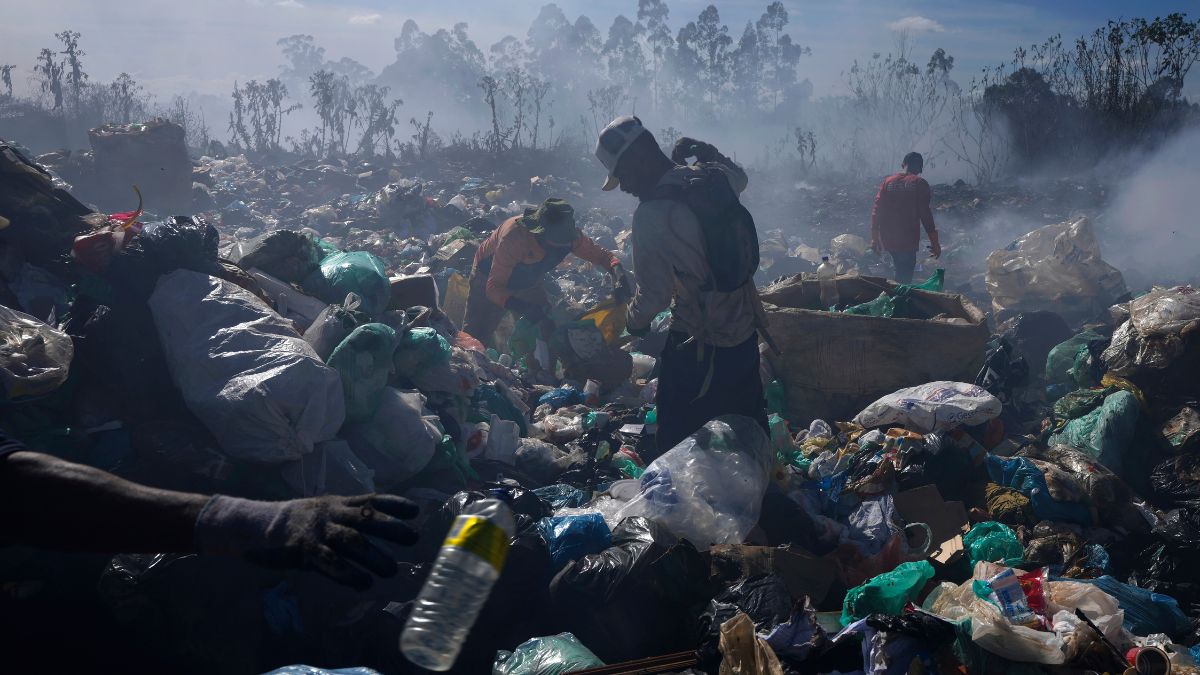Negotiators gathered in South Korea’s Busan for the fifth and final round of discussions to draft the world’s first legally binding treaty addressing plastic pollution.
The proposed agreement seeks to heavily reduce the millions of tonnes of plastic waste generated annually. National delegations, along with industry representatives, scientists, and environmentalists, are participating in shaping the global response to this crisis.
ALSO READ | Nailing it: How a Japanese manicurist is dealing with plastic pollution
During the opening session, South Korea’s Minister of Environment, Kim Wansup, said, “We must end plastic pollution before plastic pollution ends us.”
The previous four global meetings have revealed sharp differences in goals and interests.
The world produces nearly half a billion tonnes of plastic annually - over twice as much as two decades ago - with much of it polluting coastlines, rivers, and wildlife, The New York Times reported. According to researchers, an estimated truckload of plastic enters the oceans every minute.
Researchers have raised concerns over microplastics found in both the environment and the human body, along with thousands of chemicals in plastics that contaminate food, water, and ecosystems. Further, the production and transportation of plastics contribute to greenhouse gas emissions, with plastics ranking as the fifth-largest global emitter if considered a country.
Recycling efforts are failing to keep pace, with only 9% of global plastic waste being recycled, according to scientists, the report said.
Will Donald Trump’s re-election stall the talks?
As negotiations in Busan reach their final stage, concerns have been raised over the possible impact of Donald Trump’s re-election on the global effort to combat plastic pollution.
Until now, the United States, which is a leading plastics producer, has shown support for the United Nations-led initiative. However, Trump’s return to the White House could change the country’s stance. His previous administration included a rollback of environmental protections and withdrawal from key international climate agreements.
Impact Shorts
More ShortsFew people believe that the US will sign an eventual treaty at all. Opposition from oil- and gas-heavy nations like Saudi Arabia and Russia - key players in plastics production - has already made reaching a consensus challenging. If the US steps back, the possibility of a legally binding agreement being finalised by Sunday seems uncertain.
Ndiaye Cheikh Sella, a delegate for Senegal and the chief of staff of the country’s environmental ministry, told NYT, “The US really engaged on this, but if they step back, it’s a big disappointment.”
Let’s take a look at the treaty talks in South Korea:
Countries explain what action they are taking
National delegations still have a lot to hammer out before there is a treaty. Most contentious is whether there will be a limit on the amount of plastic that companies are allowed to produce.
Led by Norway and Rwanda, 66 countries plus the European Union say they want to address the total plastic on Earth by controlling plastic design, production, consumption and what happens at the end of its life.
Some plastic-producing and oil and gas countries, including Saudi Arabia, vigorously oppose such limits.
Global plastics production is set to reach 736 million tons by 2040, up 70% from 2020, without policy changes, according to the Organisation for Economic Co-operation and Development.
Negotiators must also decide whether the treaty will reduce or eliminate single-use plastics. They’ll have to resolve whether to end the use of hazardous chemicals in plastics and whether these steps will be mandated or merely encouraged.
Their common objective is to protect human health and the environment.
There are some things many countries agree on. They want provisions in a treaty to promote the redesign of plastic products so they can be recycled and reused. They want to invest to better manage plastic waste. They want to increase recycling rates and help waste pickers transition to safer jobs. There is agreement that there needs to be a mechanism to help countries pay for anything required of them.
What the environmental groups want
Graham Forbes, who is leading a Greenpeace delegation in Busan, said his group could support an agreement that puts sensible guardrails in place to reduce the amount of plastic produced, eliminates toxic chemicals and protects people from the uncontrolled use of plastics. That’s achievable, but will take political leadership and courage not seen yet in earlier negotiations, he added.
Frankie Orona, executive director of the Texas-based Society of Native Nations, said they demand a treaty that tackles the root causes of the crisis rather than just managing plastic waste.
“We must seize this moment and leave a legacy we can be proud of, with a non-toxic sustainable future for all children and our children’s children," he said.
ALSO READ | COP29: Can revenue from crypto and plastic help fight climate change?
The stance of the plastic industry
Industry leaders want an agreement that prevents plastic pollution by redesigning plastics to be reused, recycled and remade into new products. They say this will keep the materials in circulation and out of the environment.
Company executives said they’ll support a treaty that recognises plastics’ benefits to society, while ending pollution.
“I would hate to miss this opportunity because we get fixated on issues that divide us rather than unite us in this purpose of ultimately addressing the issue of plastic pollution," said Steve Prusak, president and CEO of Chevron Phillips Chemical Company.
“It’s a really critical time. We’re really hopeful that what we get out of the meetings will lead to practical, implementable policies and harmonisation across the globe.”
What the UN wants
UN Environment Programme Executive Director Inger Andersen said the treaty talks are a historic opportunity to land an agreement and course-correct, something “entirely within our reach.”
“We can sit and wait and negotiate and negotiate and negotiate. But meanwhile our oceans are chockablock with plastic,” she said.
With inputs from AP


)

)
)
)
)
)
)
)
)



